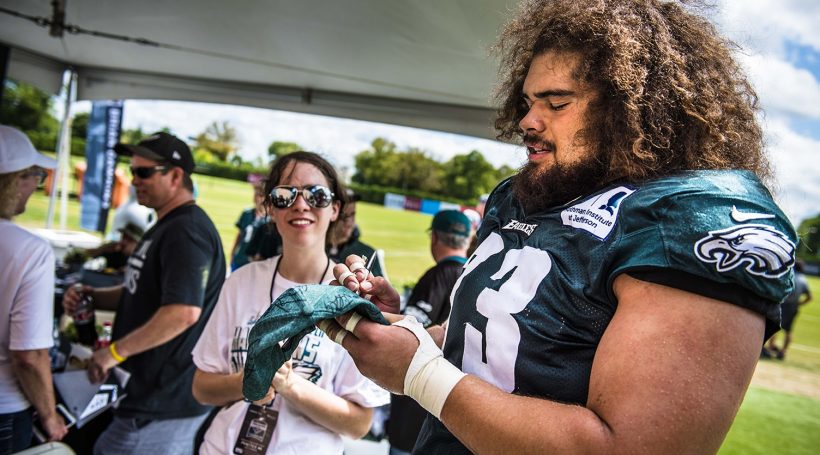The beginning is here. We’ve been waiting for months, and now we can sit back and watch (and cheer) as the Eagles start down the road to another season of exceptional leadership, unmatched synergy and outstanding performance – and of course, another Super Bowl championship.
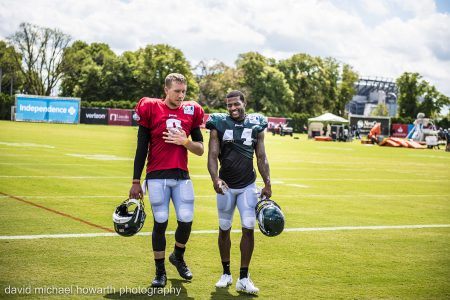 Foles & Wentz
Foles & Wentz
It is the most unusual of circumstances for an NFL locker room, one that would make most teams squirm wondering how the egos of their star quarterbacks could handle the situation. One of them, Carson Wentz, is a superstar quarterback in his third season, the face of the franchise and the player around whom the Eagles have constructed the roster. The other, Nick Foles, stepped in at the position when Wentz was injured last year and guided the Eagles to their first Super Bowl victory, earning Most Valuable Player in Super Bowl LII along the way.
Two quarterbacks.
One position.
“I guess on most teams that might be an issue, but that’s not the way we see it,” Foles says.
“Carson is the quarterback here. I knew that when I signed [as an unrestricted free agent prior to the 2017 season]. My job is to be there if Carson can’t go. When he’s healthy, he’s the quarterback. I’m very comfortable with that.”
The Wentz-Foles relationship sets the tone for the Eagles’ locker room. That they have put the team ahead of their individual situations has helped create a winning chemistry on the roster as the Eagles look to repeat their Super Bowl championship.
Neither Wentz nor Foles has expressed the least bit of dissatisfaction with their respective roles. They’ve been consistent with their messaging and their actions.
“Nick is a great friend and a great quarterback,” Wentz says. “I am so happy for his success. We’re here for the Philadelphia Eagles, not for our personal gains. I’m a competitive person, and so is Nick. We both want to play. I think what’s great is that the team has confidence in both of us and, obviously, he did an amazing job last season winning the Super Bowl. It’s all good. We’re just great friends and great teammates. There is no hidden agenda.”
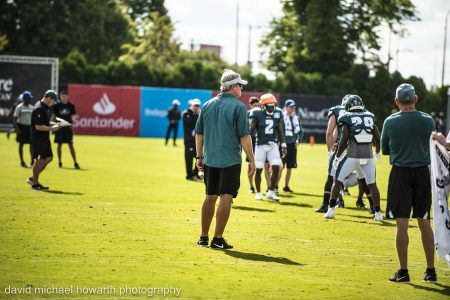 Doug Pederson, Year 3
Doug Pederson, Year 3
A scene from this year’s training camp practice:
The Eagles defense has just stopped the Eagles offense in a goal-line situation, and the defensive players are whooping it up. Head coach Doug Pederson runs over to the group, cheeks puffy and red, looking furious. “That’s a flag! That’s a flag,” Pederson screams, signaling as if he’s an official throwing the flag.
The defensive players look shocked, irate, agitated. “Whaaaattttt???” safety Malcolm Jenkins yells.
Pederson slows down. Steps back. Smiles.
“Sideline infraction,” he says, laughing.
And the defensive players tumble to the ground laughing.
That’s the kind of connection Pederson has made with his Eagles. He’s completely comfortable with them, and they with him.
“I think the key is that they heard my message from the start, in my first year,” Pederson says of the 2016 season when the Eagles went 7-9. “We had some struggles.
We lost five games in a row. Lost some tough games. But we never stopped fighting, never stopped competing. That was important.”
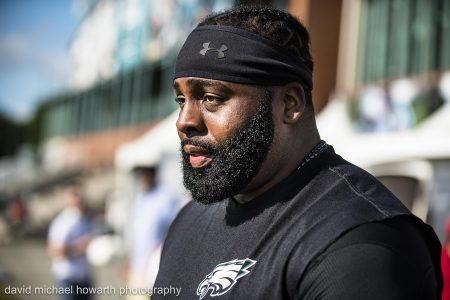 Pederson won Super Bowl LII with a backup quarterback, a backup left tackle and a backup middle linebacker. He won it by being aggressive and calculated and loose. He won it by outscoring the “Greatest of All Time” coach Bill Belichick and G.O.A.T. quarterback Tom Brady.
Pederson won Super Bowl LII with a backup quarterback, a backup left tackle and a backup middle linebacker. He won it by being aggressive and calculated and loose. He won it by outscoring the “Greatest of All Time” coach Bill Belichick and G.O.A.T. quarterback Tom Brady.
Doug Pederson is a Super Bowl winner.
“It’s really an amazing, remarkable feeling,” he says. “That’s going to be with all of us for the rest of our lives. But now, we have to turn the page. I want this team to be the very best it can be. We have to work hard, we have to pay attention to detail and we have to be focused. I want the Philadelphia Eagles to get used to playing into January and into February each season. That’s the goals we’ve established for ourselves, and I’m going to be honest and open with the players every day. I think they appreciate that.
I know I did when I played.”
The Daily Diet: Serving up Energy & Strength
Take a walk around the NovaCare Complex any day during training camp, and one theme is very apparent: The players have more food and drink at their disposal than you can imagine. The cafeteria features a full staff of chefs, who prepare three meals daily. When the players exit the practice field, there is a refrigerator stocked with water and Gatorade just 10 steps away. As the players near the locker room, they have fresh, nutritious smoothies and on-the-go snacks prepared. Another refrigerator outside the strength and conditioning room has post-workout drinks and supplements available.
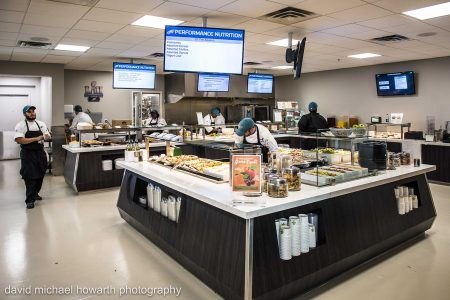 Good eating and plentiful hydration keep a football player ticking.
Good eating and plentiful hydration keep a football player ticking.
“It’s important that what you put in your body is going to help recovery and keep you at your best,” says tight end Zach Ertz. “I’m sure if we didn’t have all of these options, some guys might eat fast food or other stuff that isn’t nutritious. That’s lousy for your body.”
There isn’t anything lousy to eat at the NovaCare Complex. Instead of piling mounds of food on their plates for a meal, the players eat a series of meals throughout the day, supplemented with healthy snacks. The foods are expertly prepared, and players can start their day with a choice of any breakfast food you can imagine – from egg-white omelets to pancakes to smoothies to fruit –and it just gets better from there. For lunch and dinner, the selection includes salads and fish and meats, so the players are fueling with great nutrition each day.
The players don’t pay for the food, of course, and the convenience can’t be beat – plus the team knows what the players are eating.
“Sometimes you may want a burger or some wings, and we have that too,” says defensive end Brandon Graham. “It’s great football. You come from college, and you’ve never eaten the right way. Here, you have to eat the right way or you won’t have the energy to go out there and get after it every day.”
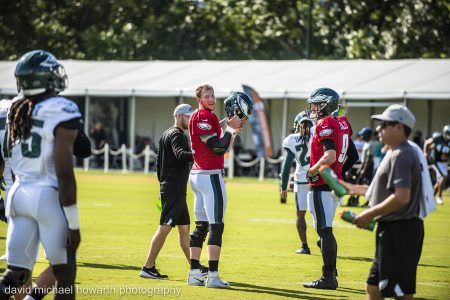 All in a day’s work
All in a day’s work
The training camp alarm rings in Corey Clement’s hotel room at 6 am. Sometimes he hits snooze and stretches his sleep time until 6:30, but then it’s on. Clement, the second-year running back from Glassboro who starred in Super Bowl LII, has to get from the team hotel to the NovaCare Complex in time to have some body maintenance done in the athletic training room, eat breakfast, get the heart rate going with some stretching and report for the mandatory team meeting at 9 am.
“You learn right away never to be late in the NFL,” Clement says. “If anything, you get to every meeting and anywhere you need to be a few minutes early.”
The rigors of Eagles’ Training Camp are not limited to the physical challenges on the field. Players spend as much time in the classroom on a daily basis as they do on the field both in camp and in the regular season. Now that the regular season is here and Clement is out of the hotel and living at home, the routine is established: After reporting every morning to training camp for days that don’t end until 8 pm, the players are out of the building by 6 pm most of the time. They have Tuesdays off each week before a Sunday game. Monday is a light day to come in and get treatment and heal the body after a punishing game day.
Players have two practices each day in training camp – one in pads and one a walkthrough – and repeat that routine in the regular season. Practice lasts for two hours. The rest of the day consists of position meetings, group meetings and time with individual coaches. Players have a 45-minute window Wednesday through Friday to meet the media.
There is very little downtime to relax.
“That’s what you have to get used to,” cornerback Jalen Mills says. “As a rookie you come in and everything is moving fast. You can’t catch your breath. But once you’ve done it, you understand the pace. You have to be on your toes. Nothing slows down in the NFL.”
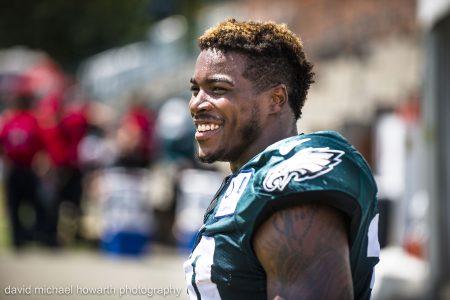 What’s in a jersey number? For some Philadelphia Eagles, quite a bit.
What’s in a jersey number? For some Philadelphia Eagles, quite a bit.
No. 11 Carson Wentz, QB
“I wore No. 20 in high school, but they wouldn’t let me wear that in college. No. 11 was one of probably four choices that were available, so I went with that. I was actually considering switching my number after a year in college, to No. 2, because at least it had part of my No. 20 from high school. But I went to see someone in the hospital that spring, a big fan of mine even though I wasn’t playing at the time, and he said he loved No. 11 and that he had a jersey and that it was the perfect number for me. Unfortunately, he passed away, and I took it as a sign from God to stay with No. 11.”
No. 71 Jason Peters, OT
“Once I moved to offensive tackle from tight end when I played with Buffalo, I picked No. 71,” Peters says. “I used to watch Walter Jones, who played with Seattle, when I moved to tackle. I studied everything about him. He’s the best left tackle to ever play the game. I wanted to be No. 71, just like him.”
No. 86 Zach Ertz, TE
“In high school I was No. 5. When I was recruited by Stanford my head coach, David Shaw, texted me and said, ‘What number do you want?’ I didn’t care. He said that I reminded him a lot of Todd Heap [former Stanford and NFL tight end] so I was given No. 86, and it’s kind of stuck with me since then,” Ertz says. “When I was drafted here [in 2014] a tight end named Evan Moore had No. 86, but he was released shortly after the draft and they gave me No. 86. I’m going to be here for my entire career and I’m going to be 86 my entire time in the NFL. That’s my goal.”
No. 27 Malcolm Jenkins, S
“I wore No. 2 since high school, and then I got to the NFL and I couldn’t wear that number anymore,” Jenkins says. “So when I was drafted in New Orleans, 27 was the only number I could wear in the 20s. I’ve become very attached to the number. It’s not my favorite number – two is still my favorite – but I’ve been rocking 27 for so long I can’t see myself wearing anything else.”
No. 62 Jason Kelce, C
“The significance of No. 62 is that when I made it to the NFL this is the number that was given to me, and I am honored to wear it,” Kelce says. “Growing up, I kind of liked the No. 13. But I had a football coach in middle school that once said to me, ‘The player makes the number, not the other way around.’ Since then, I’ve taken the number that was handed to me. I have an identity with 62.”
No. 4, Jake Elliott, PK
“I was just given the number. Didn’t have a choice. The irony is that I loved 22 when I was a kid, so two plus two works for me. I think it looks solid on me.”


